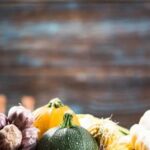Are you interested in starting your own vegetable garden in Colorado? From the plains to the mountains, the state’s unique climate and soil present both challenges and opportunities for successful vegetable gardening.
In this article, we will explore the ins and outs of Colorado vegetable gardening, providing a comprehensive guide to help you achieve a bountiful harvest. Whether you’re a seasoned gardener or just getting started, our month-by-month planting calendar, tips for success, and common challenges and solutions will help you make the most of your garden.
Colorado’s diverse climate and varied geography create an exciting environment for growing vegetables. Understanding how these factors impact your garden is crucial to successful cultivation. Additionally, we will discuss the best vegetables to plant in Colorado and provide valuable information on soil management, watering techniques, pest control, harvesting, and preserving your home-grown produce.
Whether you reside in Denver, Boulder, or any other part of the state, this guide will equip you with the knowledge and resources necessary to thrive as a Colorado vegetable gardener. With community events and connections to other gardeners and experts in the field also provided, you’ll have ample support as you embark on this rewarding journey. So grab your gardening tools and get ready to dig in – let’s set the stage for a successful harvest.
Understanding Colorado’s Unique Climate and Soil for Vegetable Gardening
When it comes to vegetable gardening in Colorado, understanding the unique climate and soil is crucial for a successful harvest. Colorado’s climate varies greatly depending on the region, but overall, it is known for its dry air, intense sunlight, and dramatic temperature fluctuations. The state also has a diversity of soils, from heavy clay to sandy loam. It’s important for gardeners to familiarize themselves with these factors in order to make the most of their vegetable gardens.
In general, Colorado experiences hot summers and cold winters, with low humidity and minimal rainfall. This means that drought-tolerant vegetables are highly suitable for this climate. Additionally, the state’s high altitude can affect atmospheric pressure and oxygen levels, which can impact plant growth. Understanding these factors can help gardeners choose vegetables that are well-adapted to Colorado’s unique conditions.
The soil in Colorado also varies widely across the state due to its diverse geography. Different areas may have different pH levels and mineral content, which can influence the types of vegetables that will thrive in a particular location. For example, some regions may have alkaline soils with high clay content, while others may have acidic or sandy soils.
By testing the soil and understanding its composition, gardeners can make informed decisions about which vegetables to plant and how to improve soil quality for better yields. Ultimately, by understanding Colorado’s climate and soil characteristics, gardeners can better plan and care for their vegetable gardens throughout the growing season as outlined in the colorado vegetable gardening calendar.
Best Vegetables to Plant in Colorado
When it comes to vegetable gardening in Colorado, choosing the right vegetables to plant is crucial for a successful harvest. The unique climate and soil conditions in Colorado present both challenges and opportunities for gardeners. By selecting the best vegetables for Colorado’s growing conditions, you can ensure a bountiful and thriving garden.
Cool-Season Vegetables
Cool-season vegetables are well-suited for Colorado’s climate, especially in the high-altitude regions. These vegetables thrive in cooler temperatures and can withstand frost, making them ideal for early spring and fall planting. Some popular cool-season vegetables to consider planting in Colorado include broccoli, lettuce, spinach, carrots, radishes, and kale.
Warm-Season Vegetables
While warm-season vegetables require longer periods of warmth to grow, they can still be successfully cultivated in Colorado with proper care and attention. Warm-season vegetables such as tomatoes, peppers, cucumbers, squash, and beans can be grown in Colorado’s lower elevation areas with ample sunlight and well-drained soil. It is important to pay attention to the specific needs of each warm-season vegetable and adjust planting times accordingly to optimize their growth.
Root Vegetables
Root vegetables are well-suited for Colorado’s soil conditions and can thrive in the state’s diverse climates. Beets, potatoes, onions, garlic, and turnips are excellent choices for Colorado gardeners looking to cultivate their own fresh produce. These resilient root vegetables can withstand fluctuations in temperature and soil quality, making them a reliable option for vegetable gardening in Colorado.
By selecting the best vegetables for your Colorado garden based on your specific location within the state and its climate variations, you can maximize your chances of a successful harvest. Whether you are an experienced gardener or a beginner looking to start your own garden, there are plenty of options available that will thrive in your area according to the colorado vegetable gardening calendar.
Month-by-Month Planting Calendar for Colorado Vegetable Gardening
Planting a successful vegetable garden in Colorado requires careful planning and timing. The state’s unique climate and soil conditions can make it challenging to grow certain vegetables, but with the right knowledge and preparation, you can enjoy a bountiful harvest throughout the growing season. This month-by-month planting calendar will guide you through the best times to plant various vegetables in Colorado, helping you maximize your garden’s potential.
March-April
As the last frost date approaches, it’s time to start sowing cold-hardy crops such as spinach, lettuce, kale, and peas. These vegetables can withstand cooler temperatures and will thrive in Colorado’s early spring weather. Be sure to choose varieties that are well-suited for the region’s short growing season.
May-June
Once the danger of frost has passed, it’s safe to plant warm-season crops like tomatoes, peppers, squash, and cucumbers. These vegetables require plenty of sunlight and warm temperatures to flourish, so be sure to provide them with a sunny spot in your garden and enrich the soil with organic matter to ensure optimal growth.
July-August
In mid-summer, you can sow quick-maturing fall crops such as radishes, beets, carrots, and green beans. These vegetables will benefit from the warm soil and ample sunlight during this time of year. Pay attention to watering needs during hot summer months to prevent stress on plants.
Following a carefully planned planting schedule based on the Colorado vegetable gardening calendar will help you achieve a productive garden throughout the growing season. By staying mindful of the unique climate and soil conditions in Colorado and selecting appropriate varieties for each season, you can enjoy a diverse array of fresh vegetables from your own backyard.
Tips for Successful Vegetable Gardening in Colorado
When it comes to successful vegetable gardening in Colorado, there are several key factors to keep in mind. One of the most important aspects is proper watering. Due to Colorado’s dry climate, it is crucial to water your vegetable garden regularly and deeply. This means providing a consistent supply of moisture to your plants while also ensuring that you are not overwatering, which can lead to root rot and other issues.
In addition to watering, soil management plays a vital role in the success of your Colorado vegetable garden. It is essential to amend your soil with organic matter, such as compost or well-rotted manure, to improve its structure and fertility. Because Colorado soil tends to be alkaline, it’s also important to monitor and adjust the pH levels as needed for the specific vegetables you plan to grow.
Pest control is another important aspect of successful vegetable gardening in Colorado. The state is home to various pests that can wreak havoc on your garden, including aphids, flea beetles, and cabbage worms. To effectively manage these pests without resorting to chemical sprays that can harm beneficial insects and wildlife, consider implementing natural pest control methods such as companion planting, using row covers, and attracting beneficial insects like ladybugs and lacewings.
By paying close attention to watering practices, soil management, and pest control strategies specific to Colorado’s unique climate and environment, you can set yourself up for a successful vegetable gardening experience in the state.
Harvesting and Preserving Your Colorado Grown Vegetables
Once you’ve successfully grown a variety of vegetables in your Colorado garden, it’s time to enjoy the fruits of your labor by harvesting and preserving your produce. The Colorado vegetable gardening calendar provides valuable information on when to harvest specific vegetables at their peak flavor and nutritional content.
For example, in the late summer months, you can expect to harvest tomatoes, peppers, cucumbers, and squash, while root vegetables like carrots and beets are ready for picking in the fall.
In addition to harvesting your vegetables at the right time, it’s important to preserve them properly to enjoy their freshness throughout the year. Canning, pickling, freezing, and dehydrating are popular methods for preserving vegetables in Colorado.
For example, many gardeners in Colorado choose to freeze excess produce such as green beans or peas for use in soups and stews during the winter months. Canning is great for preserving tomatoes into sauces or salsa that can be enjoyed long after the growing season has ended.
Properly storing harvested vegetables is also crucial for extending their shelf life. For instance, root crops should be stored in a cool, dark location such as a root cellar or basement to prevent spoilage. Many leafy greens and herbs can be kept fresh for longer periods by placing them in an airtight container with moisture-absorbing paper towels before refrigeration.
| Vegetable | Harvest Time |
|---|---|
| Tomatoes | Late summer |
| Peppers | Late summer |
| Cucumbers | Late summer |
Common Challenges and Solutions for Colorado Vegetable Gardening
Colorado’s unique climate presents specific challenges for vegetable gardening, particularly when it comes to dealing with frost, hail, and extreme temperatures. However, with the right strategies and solutions in place, gardeners can still achieve a successful harvest. Here are some common challenges you may encounter in Colorado and how to address them:
1. Frost: Colorado is known for its unpredictable weather patterns that can bring late spring or early fall frosts. To protect your plants from frost damage, consider using row covers or cloches to shield them from the cold. Additionally, selecting cold-hardy vegetable varieties and planting them in raised beds can help mitigate the risk of frost damage.
2. Hail: Hailstorms are a frequent occurrence in certain parts of Colorado and can wreak havoc on vegetable gardens. One effective way to minimize hail damage is by installing netting or protective covers over your garden beds. For potted plants, moving them under cover during a hailstorm can provide temporary protection.
3. Extreme Temperatures: Colorado’s high elevation exposes gardens to intense sunlight and temperature fluctuations. To combat this challenge, consider implementing shading techniques such as using shade cloth or planting taller crops to provide natural shade for more sensitive vegetables.
By being proactive and employing these strategies, gardeners can successfully navigate the challenges posed by frost, hail, and extreme temperatures in Colorado’s unique climate.
Remember that every region offers its unique challenges but also opportunities for thriving vegetable gardens. By staying informed about the best practices specific to your area like those included in the colorado vegetable gardening calendar you will be on your way to a rewarding growing experience.
Community Resources and Events for Colorado Vegetable Gardeners
In conclusion, the Colorado Vegetable Gardening Calendar provides invaluable information and guidance for gardeners in the state. With a unique climate and soil, understanding the specific requirements and best practices for vegetable gardening in Colorado is essential for a successful harvest. The month-by-month planting calendar offers a comprehensive guide for when to plant various vegetables, taking into account the state’s climate and weather patterns.
Additionally, the article includes tips for successful vegetable gardening in Colorado, covering important aspects such as watering, soil management, and pest control. This thorough resource also addresses common challenges that Colorado gardeners may face, such as frost, hail, and extreme temperatures. By providing solutions to these challenges, the article equips gardeners with the knowledge needed to navigate through potential obstacles.
Moreover, community resources and events are highlighted as an important aspect of vegetable gardening in Colorado. Connecting with other gardeners and experts in the field can provide valuable support and knowledge sharing opportunities.
Whether through local gardening clubs or attending events such as workshops or farmer’s markets, engaging with the larger community of vegetable gardeners in Colorado can enhance one’s gardening experience. Overall, this article serves as a valuable guide for anyone looking to cultivate a successful vegetable garden in Colorado.
Frequently Asked Questions
When Should I Start a Vegetable Garden in Colorado?
In Colorado, the best time to start a vegetable garden is typically in late April or early May. This allows for the last frost to pass and for the soil to warm up, providing optimal conditions for planting.
What Month Should I Plant My Vegetable Garden?
The most common month to plant a vegetable garden in Colorado is May. By this time, the threat of frost has usually passed, and the soil has warmed enough to support the growth of various vegetable plants. However, it’s important to check your specific location’s frost dates and weather patterns before planting.
What Are the Best Vegetables to Grow in Colorado?
Some of the best vegetables to grow in Colorado include root vegetables like carrots, beets, and radishes, as well as leafy greens such as lettuce, spinach, and kale. Other popular choices are tomatoes, peppers, squash, and herbs like basil and thyme. These vegetables tend to thrive in Colorado’s climate and growing conditions.

If you’re looking to get into vegetable gardening, or are just looking for some tips on how to make your current garden better, then you’ve come to the right place! My name is Ethel and I have been gardening for years. In this blog, I’m going to share with you some of my best tips on how to create a successful vegetable garden.





